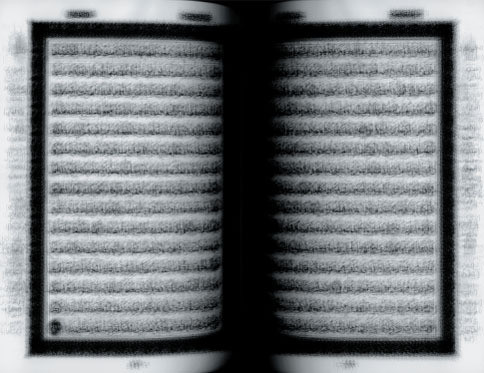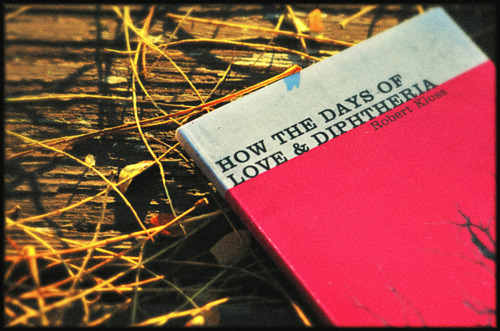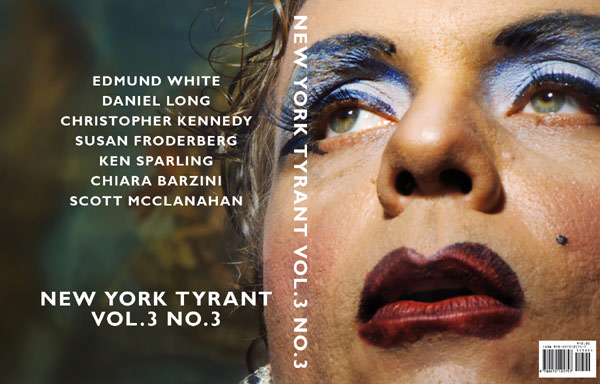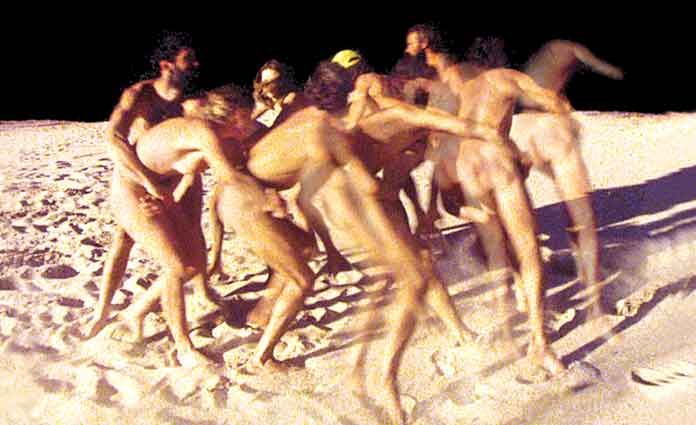{LMC}: The Multiplying Self
Sometimes we want to dance, even those of us who say we don’t like to. Colin Winnette’s narrator meditates upon this desire, but only for a moment. The narrator exists in fragments, and the part of him that wanted to dance, named “An Evasive Aspect of My Personality,” is denied the pleasure of turning and moving to music, denied this approximate transcendence. In certain moments, different aspects of the narrator take precedence. We are a sum of our parts, but it doesn’t mean the parts have to work together.
Personalities are shaped in fiction by the discourse. We say, “This narrator is unreliable.” “This narrator is sympathetic.” “This narrator shows what it’s like to live in a war torn country and how to go beyond nationalism.” However, even these moves are not transparent inside of fiction. Characters are led by their authors to decisions that lead us to judge them. Dialogue helps characters reveal themselves to us, we get exposition, or free indirect discourse moves a reader along inside a character’s head, trailing his or her thoughts.
{LMC}: Hug Beecher’s One Before Bed and It Hugs Back

Beecher’s One has an effect on me, and not just because of the wonderful stories. More than any other journal I have read, holding it evoked an emotion, much like the words did. When nobody was looking, I may have rubbed the journal all over my face, took deep breaths over its pages and whispered secrets into its binding, which I have learned is called a “naked” binding. How sexy.
Daniel Rolf is responsible for my affection for the design. He said the original concept for the binding was to make the first issue a “simple container for the text, but also something interesting to hold and look at.” Well, he surpassed that goal by quite a bit.
Blog Is Still a Four-Letter Word

Monday morning. Cold cat-nose, green tea, sleepy checking of email. Among the messages, one from my workshop leader, asking if I could stop by her office to talk before class.
Back up, explain: I’m a brand-new, first-semester PhD student in a creative writing program. I’m a poet; I’m a woman; I’m forty-two. And I moved to this city exactly three months ago to start the program. It was an astonishing stroke of good fortune to get accepted, and I was deeply excited to move here and to do good work. But I’d be lying if I didn’t say that these three months have felt pretty much like trying to drink from a firehose.
That’s okay—that’s how it is when you’re somewhere new. New city, new acquaintances, new university bureaucracies and departmental eccentricities. A new roomful of bright undergraduate faces staring up at me three mornings a week. It’s a struggle to adjust, but as more or less a career academic (in the sense that I career among institutions, jostling back and forth around and between them), I’m used to transitions and I’ll be here for the next five years. I’m a little daunted, but not too badly. I may weeble but I don’t fall down.
Nonetheless when my workshop leader asked me to come chat with her, I was grateful. I knew she’d met one-on-one already with the other members of the class to discuss their writing; they said she’d been extremely helpful and frankly I kind of felt like I needed some extreme help, to get through the whole drinking-from-a-firehose part of the experience. I felt optimistic about maybe getting a dab of reassurance from her—that thin trickle of validation that lets you know there’s some point in continuing the effort.
Imagine, then, if you will, my surprise. READ MORE >
Beecher’s and the Game Narrative
Perhaps it is a reaction to the interactive time we live in—where video games and the Internet create portals to different worlds, where we control the x,y,z—but Beecher’s, in its inaugural issue, has curated, whether they are aware of it or not, a small collection of fiction and poetry that exist in two places: a realm of narrative and that of the participatory game.
The first, striking example of the journal’s interactive nature is the design. That point may seem self evident—you interact with the journal as you would with any other book—but there is something more to Beecher’s. The pages are porous. They absorb dirt, fingerprints, and oil. The binding is loose. When it is in your grasp, you are handling something precious, an antiquity. A person like myself, who believes in the preservation of items, finds that holding the journal, attempting not to damage it, is a thoroughly conscious process.
The journal being physical as opposed to electronic means you can’t click links in Beecher’s as you would in a hyper-text journal. The writing has to works harder to to encourage reader interaction. Here is where the journal begins to push real boundaries.
In Rebecca Wadlinger’s poem, “Mrs. Mayfield and the Museum of Bodies,” the narrator touches statues and paintings in an unnamed museum under the suspicious gaze of a security guard. When the guard blinks, the narrator/poet sneaks a touch. The guard, by the end of the poem, is so worn down by the narrator’s persistence that he allows her to interact with the art, finally, as she truly desires.
Cohen’s “The Rules (Gulf Version),” is a set of game rules which informs the reader that any number of people may participate in the game/narrative, as long as they are human like you and me. But, for practical purposes, the participants in the game must “exceed one”, drawing the reader into the “game.” During my interaction with the story, I was forced to wonder whether I was playing a game with the author, or with the characters of the story. Either way, a dead body became a heavy load at the end of the story, requiring redemption and resuscitation that only I, as the reader and participant in the game, could supply. READ MORE >
All of My Desire to be Involved: An Interview with Robert Kloss

Robert Kloss is the author of How the Days of Love & Diphtheria (Mud Luscious Press/Nephew) and The Alligators of Abraham (Mud Luscious Press, 2012). He is found online at rkbirdsofprey.blogspot.com.
Jackson Nieuwland: This is my first time being a ‘real’ interviewer. I’ve interviewed people before but they were pretty close friends of mine and I just posted the conversations on my blog. I don’t know you that well and hopefully this interview will be published somewhere cool. I enjoy interviewing, the finished product often feels like a significant achievement. I’m going to try and continue with my personal ‘style’ of interviewing here by asking you questions in bunches to be answered together and putting myself into the interview a bit (you are encouraged to ask me questions if the urge takes you). Have you been interviewed before? Have you interviewed people before? Do you have any interest in the artform of the interview? Do you read many interviews? What sorts of interviews do you prefer? Text? Audio? Video? What are your thoughts on each medium? Have you watched any of Nardwuar’s interviews? Do you have any favourite interviewers? Do you have any favourite interviewees? Are there any types of questions you particularly like or dislike?
Robert Kloss: I’ve interviewed a few people but I never really felt too comfortable with the process. It was fun and the writers I interviewed were very good to give their time and thoughts, but I don’t know that I had a knack for the form. I think a good interviewer is curious and is open to a certain process of discovery and I’m afraid I’m just not a very curious person. And, when it comes to people, I’m at the opposite of curious–the thoughts and particular cares or wants of a certain person just aren’t interesting to me anymore. So I don’t read or watch too many interviews. I don’t even read the letters or journals of famous writers anymore. Even if the conversation is profound (and they rarely are) I’m not sure I get much out of it. It wasn’t always like this. I used to watch Charlie Rose, for instance, because I was interested in World Figures. And I used to read interviews with filmmakers and composers and writers I admired. But I’m just not terribly curious anymore. That said, there are some people, some writers, who take the interview and turn it into a real art, a sort of extension of their work, and I do find that interesting/readable. Partly because I’m new to the idea of presenting myself to the wider world, and shaping that image in a certain way. But partly because while the mundane thoughts and opinions of some stranger aren’t terribly interesting, that stranger’s art probably is. I feel like any writing worth much is a reflection of the truest part of the writer anyhow so why shouldn’t the writer present themselves as what they are, a reflection of their art? READ MORE >
TYRANT 9 PRE-ORDER/POST-OP

A year’s passed since the last issue of the Tyrant came out. That’s fucked up. This is unacceptable for a magazine that is supposed to be a bi-, or even tri-, quarterly, and my sole excuse is that I don’t have an excuse. I want to blame it all on Luke (co-editor, friend, part-time lover) in full, for moving to Texas, but I won’t, because I really can’t. Whatever took it so long (and come on, who noticed or really cares that much?), to try to make up for the time you’ve had to wait, I thought I would expose/humiliate/shame myself for you all to have a good cringe or laugh at. Hopefully maybe both. My idea for the cover was to have me in drag on it because I thought it would be really like, self-absorbed-seeming. I wanted to try to get ultra-vanity press on it, even though that doesn’t even mean that.
I’ve always thought drag queens were exceptionally brave people, but personally, I’ve never been “into” wearing women’s clothes or looking like a woman. However, I have done it twice in the past year so who knows what’s up with that. Drag is such an odd experience. For me, it was strangely intoxicating. While I was dressed up, and even for a couple of hours after, I felt like I’d been drugged, but in a good way. Probably best we don’t get into all that here though. READ MORE >
{LMC}: Yelena Akhtiorskaya in Beecher’s #1
The editors of Beecher’s #1 should be applauded for picking fiction and poetry that are all remarkably consistent in structure and tone. This issue of Beecher’s values images over plot in the traditional sense. The pieces are usually quite short and aim to evoke a mood through the use of exquisite, concise, and deliberate writing. Basically, if you’re looking for sensitive stories about sad people in the suburbs having affairs, or speculative romps through alien lands, then this ain’t the journal for you.
The writing in Beecher’s is almost uniformly great and most of the pieces succeed at their goals. But this consistency could, somehow, work against the journal in the long run. I couldn’t read more than two or three entries in one sitting, and they’re short (most of the fiction is a page or two), because it all started to sound a little too much alike. The pieces are so similar to each other that I kept forgetting who the authors were. At times I’d think that I had already read a story, but then realize I was confusing it with another piece with a similar tone and feeling. For example, the lists and repetition in Joshua Cohen’s story, “The Rules (Gulf Version)” is very similar to the lists and repetition in Colin Winnette’s “Playing with Myself: A Series”—even the titles sound the same. John Dermot Woods’s flash fiction, featuring unique characters in unique, unsettling situations, is pretty similar to Alexis Orgera’s prose poems, which feature unique characters in unique, unsettling situations.
This observation isn’t meant to take anything away from the separate pieces. Orgera’s poems are some of the strongest in the journal, and Cohen is as dazzling as always. Perhaps this is a larger debate. Is it possible for a journal to be too consistent? When does a sustained effect move from intriguing to repetitive?
{LMC}: I Want to Be The Girl With the Most Cake

Beecher’s, Issue Number One, Interview w/ Stephen Elliott:
Q: What do you think most people like about your writing?
A: I think people connect with the struggle for honesty.
November 4th, 2011 / 1:00 pm
The Collaborative Workshop

A few years ago, when I moved from L.A. to Kansas and began my dizzying transition from grad student to faculty member, I dug out of my closet the stacks and stacks of workshop manuscripts of my early efforts. There they were: fifteen copies of every lousy draft I’d produced, each decorated with marginalia and scribbled endnotes. Sometimes whole paragraphs were blacked out, as if my classmate were an overzealous FBI agent releasing my story under the Freedom of Information Act. Sometimes a poignant protest “No!” would appear to tumble through the white space, alongside a disappointed “You know better!”
Some of these notes were ten years old, but as I looked at them again, the nausea was fresh in my throat. There were hundreds of these, representing my years in an MFA and then a PhD program, contradicting each other in a cacophony of criticism and praise, some written by people whose faces for the life of me I could not remember. It took several trip down two flights of stairs and across a parking lot, but I tossed them all into the apartment complex dumpster. Good-bye to all that.
I WANT TO PAY A LOT FOR PREMIUM DIGITAL CONTENT
let me pay for premium online content.
i tried to get a digital-only subscription to the new yorker. but it doesn’t exist. i want it in my car service when i leave my advertising agency at 10:30 pm. i am always busy. i need speed and i desire information. i want to have access to that content in a fluid way.
i would pay 100 dollars a year for a digital subscription to the new yorker. 30 dollars more than the physical paper subscription price.
i want to read a digital version of vanity fair on my phone and not have to throw away a physical magazine. when i am in the hamptons, i want this very much.
let me pay.



